Illinois Baptist



What will the new year mean for the church?

COVID–19 response




WORSHIP Church attendance
Tied to better mental health
TABLE TALK Revival begins with me
Doug Munton

P. 14
FAITH & POLITICS
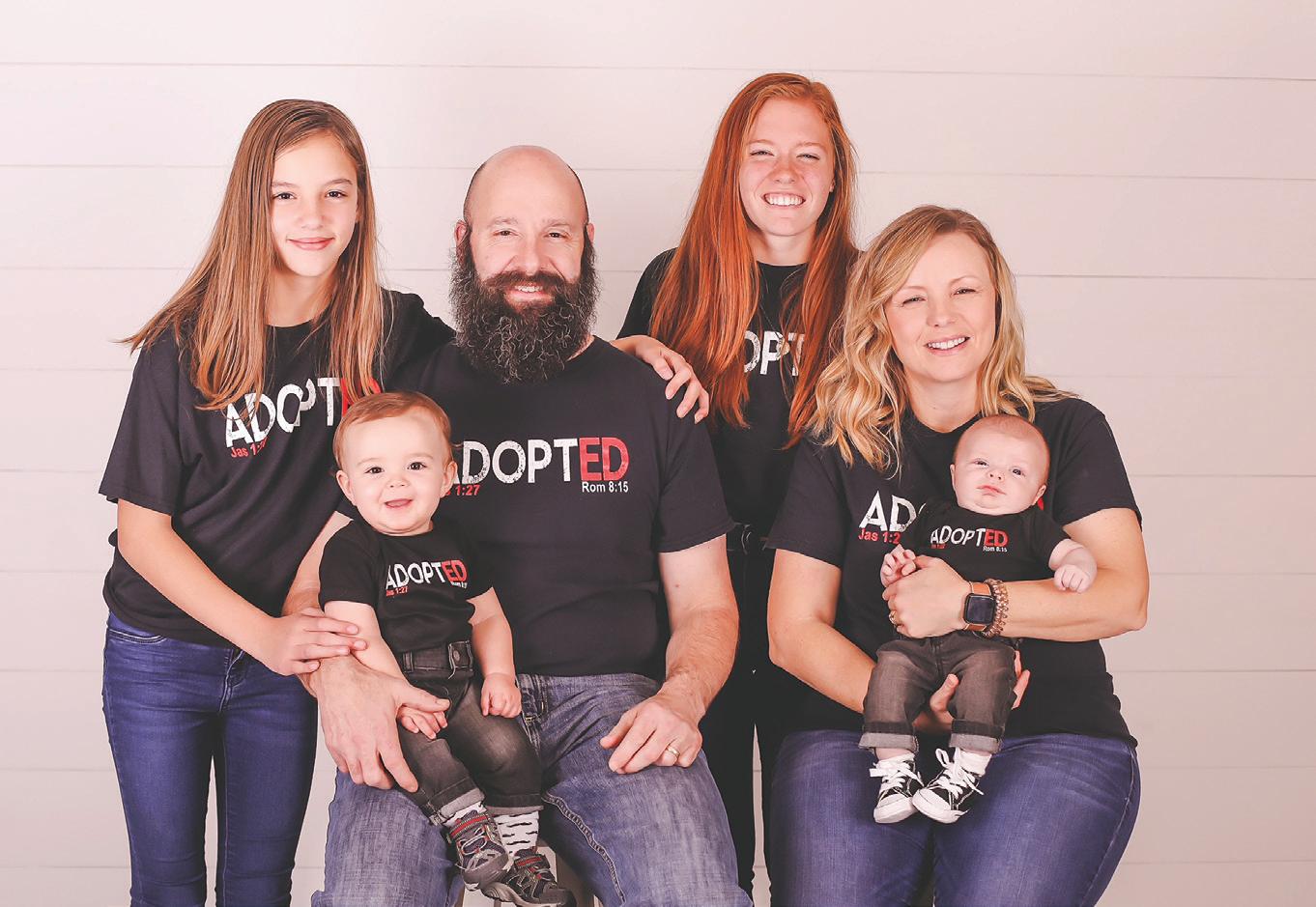
Gains and losses
For evangelical voters P. 10
Across
the church to receive free groceries and supplies. And many of them stayed to help, he said.
“We had a lot of people from the neighborhood come to get food, but a lot of them stayed to help and unload the trucks,” Sedabres said. “To

see the people come out and stand in the rain and help us, it was unbelievable. It was nothing short of a miracle of God.”
His church was one of six central and southern IBSA congregations that participated in massive food distributions just before Thanksgiving. In Springfield (pictured above), around 1,000 people were served at Springfield Southern Baptist
Fewer churchgoers say they’re comfortable inviting people to an online service than in-person worship, Barna found. Still, the majority say the current season hasn’t changed the number of invitations they extend:
Location: Edgewater
Focus: Residents of this lakefront community
Characteristics: Edgewater is a soughtafter community on the city’s north side. It’s estimated that 6-8% of households are same-sex couples, compared to the U.S. national average of just over 1%.
Prayer needs: Pray for a church that is able to share core values of community and environmental care from a biblical perspective
– IBSA Church Planting Team
Giving by IBSA churches as of 12/18/20
$5,153,831
Budget Goal: $6,011,539
Received to date in 2019: $5,554,205
2020 Goal: $6.3 Million
Editor - Eric Reed
Managing Editor - Meredith Flynn
Graphic Designer - Kris Kell
Contributing Editor - Lisa Misner
Administrative Assistant - Leah Honnen
The general telephone number for IBSA is (217) 786-2600. For questions about subscriptions, articles, or upcoming events, contact the Illinois Baptist at (217) 391-3119 or IllinoisBaptist@IBSA.org

The Illinois Baptist is seeking news from IBSA churches. E-mail us at IllinoisBaptist@IBSA.org to tell us about special events and new ministry staff.

POSTMASTER: The Illinois Baptist is owned and published every month by the Illinois Baptist State Association, 3085 Stevenson Drive, Springfield, Illinois 627034440. Subscriptions are free to Illinois Baptists. Subscribe online at IBSA.org.
NATE ADAMSMost of us are welcoming 2021 into our lives with a special enthusiasm, eager to say good-bye to a 2020 filled with pandemic pain and inconvenience as well as political, racial, and economic turmoil. We are all ready for a fresh start.
But of course fresh starts are birthed out of past experiences. We are often made ready for the future by the stretching, growing, and learning that took place during our immediate past.
I’ve been watching our new grandson and granddaughter go through this process, almost daily it seems. As they learn to eat, and grasp, and hold their heads up, and roll over, they are allowing their outside world and those in it to stretch them into uncomfortable places. There are plenty of tears along the way. Yet in the process, they are growing, and learning, and being prepared for their future.
Certainly churches, pastors, and church members have been stretched significantly throughout 2020, perhaps more than any year in recent memory. We mustn’t merely lament the discomfort of the stretching. We must embrace the learning and the growing that can prepare us for the future.
In fact, the theme of IBSA’s upcoming 2021 Illinois Leadership Summit is “Future Church: Leading the Church Through COVID and Beyond.” We are in a key season for pastors and church leaders to ask how church life and church leadership may need to adapt to be more mission-effective in the future.
As a network of churches, IBSA is also engaged in a strategic planning process that asks questions about future effectiveness. For example, we have asked, “If the churches of IBSA were to create our network from scratch today, what would it look like? How might it be different?”
We have already made structural and staffing changes at IBSA acknowledging that what churches need from their network in the future will be different than what they may have needed in the past. We are discovering that churches are far less driven by uniform programs than in the past, and that program providers can often now service churches more directly. A network like IBSA can best deliver value to its member churches by focusing less on programs and more on overarching processes that can adapt to the specific needs of each church.
IBSA’s future focus is now on the fundamental processes that we simply call health, growth, and mission. These are the primary needs that churches are expressing. And as a statewide missions strategy, we believe that healthy churches will grow (through growing leaders), and that growing churches and leaders will be on mission, and that on-mission churches will in turn invest in the health and growth of other and new churches.
While we believe focusing on these three strategic processes will be helpful to all the churches in the network, we are also seeking to grow in our ability to engage each individual church where it is, and to ask how the network can help that church in its next step of fulfilling its unique vision and mission.

Throughout 2021, I will be writing more about IBSA’s future focus. Of course, it is still a work in progress. I mention it now mainly to emphasize that all of us—from babies to adults, from church members to pastors, from individual churches to church networks like IBSA—should be asking how the year we just endured may have been intended by our loving God to prepare us for the year ahead.

Nate Adams is executive director of the Illinois Baptist State Association. Respond at IllinoisBaptist@IBSA.org.

How can we adapt now to be more mission-effective in the future?
Survey results released in late 2020 were a bright spot for churchgoers in an otherwise dim year. Gallup found frequent church attenders were the only group who reported gains in mental health during the year, even as most churches shut down temporarily to help stop the spread of COVID-19.
Gallup’s annual health survey found 34% of Americans classify their mental health as “excellent,” which is an all-time low. But 46% of Americans who attend religious services weekly said their mental health is excellent, up from 42% last year.
As many states continued to grapple with spikes in COVID cases, the national conversation shifted to the first vaccines administered in early December. Some public health officials have reached out to faith leaders in an effort to encourage churchgoers to get vaccinated when immunizations become available.
Francis Collins, director of the National Institutes of Health, joined Ethics and Religious Liberty Commission President Russell Moore for a Dec. 3 webinar about the vaccines. “I want to assure you as a scientist, as a physician, as a researcher who has been in the middle of all of this since January, we have done nothing to compromise in even the smallest way the safety or the efficacy standards for these vaccines,” he said.
The atheist turned Christian spoke specifically to fellow believers in Christ. “Here’s a great opportunity for Christians to say, ‘Let’s really look at the truth of the situation and evaluate what the evidence demonstrates for and against the idea that this is something I want to take advantage of myself.’”



A three-judge panel of the Ninth Circuit Court of Appeals said Dec. 15 that the state of Nevada’s pandemic-related restrictions treat secular events and businesses “significantly better” than worship services. The judges granted a preliminary injunction against attendance limits that are stricter for houses of worship than for other entities, including casinos.
“This is a significant win,” said David Cortman of Alliance Defending Freedom, who is representing Calvary Chapel Dayton Valley in their challenge of Nevada’s restrictions. “There is no constitutional right
to gamble, but there is one that protects attending worship services. The government has a duty to respect the First Amendment, so it can’t single out churches for harsher treatment than secular activities.”
The Nevada ruling was the most recent in a string of religious liberty victories for churches challenging restrictions on worship gatherings. In November, the U.S. Supreme Court temporarily barred New York from enacting certain restrictions on churches and synagogues in areas identified as COVID hotspots. In light of their ruling, the justices ordered lower courts to reconsider rulings in California, Colorado, and New Jersey concerning worship restrictions.
Springfield | Offered online for the first time, the Illinois Leadership Summit will address post-pandemic ministry and inspire church leaders toward a vision for the future. IBSA leaders have designed two ways to experience the Summit this year. Viewers can log on for a completely virtual experience or watch the simulcast with smaller groups meeting at several hub locations around the state.
Future Focus: Leading Your Church Beyond COVID-19 is the theme of the Jan. 19-20 event, which will feature leadership expert Dave Rhodes He is co-founder of Future Church Co., and pastor of discipleship and movement initiatives at Grace Fellowship Church in Atlanta. Rhodes will lead three sessions focused on ministry leadership for the future of the church.
Illinois pastors and ministry practitioners will lead breakout sessions in four tracks:

Shepherding: Soul Care in COVID and Beyond. Sessions include leading a church into authentic relationships and helping hurting people heal together.
Teaching: Connecting Truth for a Post-COVID World. Illinois leaders will teach on the power of truth in a fake news world, deepening leadership through aligned teaching, and reimagining the role of an equipper to a church scattered.
Mobilizing: Wide Open Missions in a Less Open World. Breakouts will help leaders begin to design innovative, effective mission strategies.
Overseeing: Reimagining a Future Church. Illinois pastors will help fellow leaders plan for 2021 (with or without COVID), prepare their own hearts for leadership, and consider kingdom expansion after a challenging season.
Held annually at the IBSA Building in Springfield, the Summit has hosted more than 200 pastors and church leaders each year since 2015. This year, IBSA zone consultants will host the hub location simulcasts, and sessions will be available online to watch live or to view afterward.
For a list of viewing locations and to register for the Summit, go to IBSA.org/ILS2021 or contact AubreyKrol@IBSA.org.
Users of the YouVersion Bible app completed almost 6 million searches of the Scriptures in 2020, an increase of 80% over the previous year, YouVersion reported. The verse of the year was Isaiah 41:10, which offered counsel for a scary year. “Do not fear, for I am with you; do not be afraid, for I am your God. I will strengthen you; I will help you; I will hold on to you with my righteous right hand” (CSB).
“While 2020 is a year so many say they’d like to forget, we see it as a year to remember how God used the Bible app to help so many people who are searching for answers,” said YouVersion founder Bobby Gruenewald. “Through every hardship, people continue to seek God and turn to the Bible for strength, peace, and hope.”

Former Liberty University president Jerry Falwell Jr. said he will “take a time out” from litigation against the school. Falwell, who resigned earlier this year amid a series of scandals, sued Liberty in October claiming the school defamed him. He announced he would drop the suit in a statement Dec. 10, but added he will “continue to keep all options on the table for an appropriate resolution to the matter.”

Liberty also addressed the dropped lawsuit, stating that the school’s administration and trustees “are pleased that Falwell has dropped his lawsuit and look forward to pressing onward with the work of Liberty’s President and Chancellor Search Committee to find the new leadership to succeed Falwell.”
International Mission Board missionaries and staff pledged more than $800,000 to the 2020 Lottie Moon Christmas Offering, which supports more than 3,500 missionaries serving around the world. “Our IMB missionaries around the world and our stateside support staff wanted to lead by example as we asked Southern Baptists to give more generously than ever before to get the gospel to the nations,” said IMB President Paul Chitwood.
The goal for the 2020 offering is $175 million in honor of IMB’s 175-year history. If the goal is met, it would be the largest Lottie Moon Offering ever.

– YouVersion, Christian Post, International Mission Board
Statements prompt debate on controversial ideology
Nashville, Tenn. | Ronnie Floyd, president of the SBC Executive Committee, has scheduled a January meeting of SBC leaders to discuss a controversial view on race that has some Baptist leaders concerned. Critical Race Theory (CRT) was the subject of a resolution adopted by messengers at the 2019 Southern Baptist Convention. Some had called for the resolution to be rescinded at the 2020 meeting, but the Orlando convention was canceled due to COVID-19.
In late 2020, as part of a reaffirmation of The Baptist Faith and Message, the presidents of the SBC’s six seminaries declared CRT to be incompatible with the doctrinal statement. SBC President J.D. Greear also affirmed their statement.
In response, the National African American Fellowship of the SBC released its own statement, asserting that theories and constructs can help uncover undetected racism. A week later, a second group released a statement on “Justice, Repentance, and the SBC.”
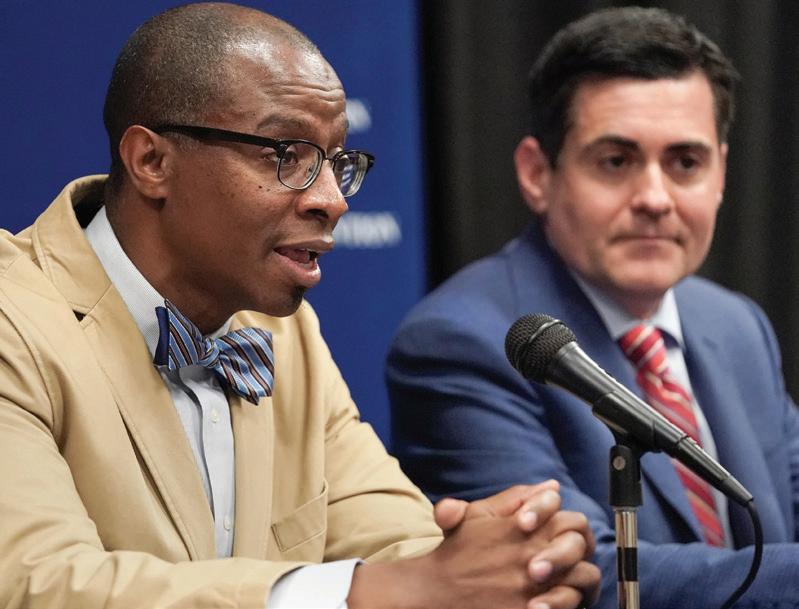
“While some progress has occurred,” the statement read, “some recent events have left many brothers and sisters of color feeling betrayed and wondering if the SBC is committed to racial reconciliation.”
Signers of the most recent statement include Fred Luter, pastor of Franklin Avenue Baptist Church in New Orleans and a past president of the SBC.
In response to the statement, Greear urged open discussion and commitment to “judging all things by the Scriptures and bringing every thought captive to Christ. We must not default to labeling believers who parse certain questions differently ‘Marxist’ or ‘racist,’” he said.
Amid the conversation around CRT, two pastors announced their churches’ departures from the SBC. In a column for Religion News Service, Charlie Dates of Progressive Baptist Church in Chicago said the seminary presidents’ statement was “the final straw” after a series of 2020 events that made him “increasingly uneasy” about continuing to partner with the SBC. Progressive Baptist is dually affiliated with the SBC and the Progressive National Baptist Convention.
Houston pastor Ralph West also announced his Church Without Walls would no longer affiliate with the SBC.
Floyd has announced he will meet in January with NAAF officers, the Council of Seminary Presidents, and Greear.
– With information from Baptist Press, Religion News Service
Alpharetta, Ga. | The North American Mission Board (NAMB) will petition the U.S. Supreme Court over a lower court ruling in a long legal battle with former Baptist state executive Will McRaney. The former executive director of the Baptist Convention of Maryland/Delaware alleges NAMB, which is led by President Kevin Ezell, intentionally defamed him and wrongfully influenced his 2015 termination by the convention.
A judge dismissed the suit in 2019, ruling the court could not consider McRaney’s
claims because of the ecclesiastical abstention doctrine. But an appeals court reversed the dismissal in July 2020, and NAMB’s request for an “en banc” hearing by the full Fifth Circuit Court of Appeals was denied in November. Trustee chairman Danny de Armas said NAMB will appeal the ruling to the Supreme Court and allow “the federal courts (to) fully explore the religious liberty protections afforded all churches and ministries by the First Amendment to the U.S. Constitution.”
– Baptist Press
Nashville, Tenn. | The Ethics and Religious Liberty Commission (ERLC) apologized for confusing language in a friend-of-the-court brief it joined last year. The ERLC signed onto the brief in support of the North American Mission Board’s request for an en banc hearing in a lawsuit brought by former state Baptist leader Will McRaney.
Authored by Thomas More Society, it contradicted Southern Baptist polity by referring to the SBC as the “umbrella Southern Baptist governing body” and describing the convention of autonomous churches and groups as a “hierarchy.”
SBC leaders including Tennessee’s Randy Davis spoke out against the language in the brief. “There is categorically no SBC denominational hierarchy, and if there were, your church would be at the top of our relational system,” Davis, executive director of the Tennessee Baptist Convention, wrote in The Baptist & Reflector newspaper.
The ERLC issued an apology Dec. 9, acknowledging problems with the language. “We fully recognize this brief created concern and unnecessary confusion.”
– Baptist Press, The Baptist & Reflector
Continued from page 1
Church, where volunteers and others gave away 40,000 pounds of food. The food, donated by the Dot Foods company, was delivered by Illinois Baptist Disaster Relief (IBDR).


The distributions were part of a 2020-specific strategy employed by volunteers to keep on serving, despite an unusual and challenging year. State coordinator Butch Porter has worked with the Federal Emergency Management Agency (FEMA), ministry partners, and companies like Dot Foods to procure needed items to distribute for free across the state.
In the final two months of 2020 alone, IBDR distributed more than $1.5 million in food, PPE (personal protective equipment), and other supplies. “That’s just awesome,” Porter reported in December, as even more supplies were en route. By the middle of the month, Disaster Relief had received 21 semi-trailer loads to distribute across Illinois.
Along with various agencies and ministries, DR also received help from a Mt. Vernon refrigeration company that loaned the ministry a walk-in cooler. Two warehouses have been donated to store supplies. And Porter and IBDR leaders are still working to distribute more.
“It’s kind of like the fish and loaves,” said Sharon Carty, a Disaster Relief leader and volunteer from Emmanuel Baptist in Carlinville. “God just kept making it multiply.”
The Thanksgiving food giveaway included items not always provided through food pantries and other distribution sites, including milk, yogurt, and cookies. Another three semi-loads went to Proviso Missionary Baptist Church in Chicago to be distributed in the city. DR also prepared 96 pallets of personal protective equipment (PPE) and distributed them across Illinois.
In Carlinville, Peggy Brown was working at Emmanuel Baptist Church as volunteers began to prepare for the food distribution there. The administrative assistant is
a trained Disaster Relief volunteer, but the distribution at her church was her first callout.
“Everybody’s struggling a little bit more due to COVID,” Brown said. Nationwide, Disaster Relief volunteers are doing what they can to meet needs compounded by the pandemic. Porter reported that volunteers from across the nation prepared more than 750,000 meals in 2020, made 6,813 gospel presentations, and saw 875 professions of faith. Disaster Relief volunteers worked more than 668,000 hours and more than 107,000 volunteer days.
In Illinois, Carty said volunteers have also stepped up to transport items where they’re needed. In a season where normal activities are on pause, she said, DR has found another avenue to serve. “People have just stepped up and said, ‘Hey, we can do that.’”
– Meredith Flynn
Springfield | Scott Harris will join the IBSA staff Jan. 1 as evangelism director and administrative director of mobilization. Harris and his wife, Teresa, will relocate to Springfield from Georgia, where he pastored Hopewell Baptist Church in Gainesville. Harris was mentored by Bobby Welch, developer of the F.A.I.T.H. evangelism strategy used in many Southern Baptist churches.
IBSA’s Brad Lovin will continue to serve as missions director, after also serving as administrative director for mobilization since September 2019. He shared with staff that he sensed God leading him to focus more on the area of missions, and had prayed he would provide the right leader for the mobilization role.
“I am thankful for the opportunity to lead the Mobilization Team over the last 15 months,” Lovin said. “It has given me a deeper appreciation for how evangelism, missions, and church planting should work together. And I am excited to continue serving as the missions director on what will soon be a fully staffed Mobilization Team.”
Also in the new year, Bob Evaul will begin serving on a contract as IBSA’s Hispanic church consultant. Evaul and his wife, Carol, served as church planting missionaries in Bolivia and have been involved in Hispanic ministry in Illinois since moving to the state in 2001.
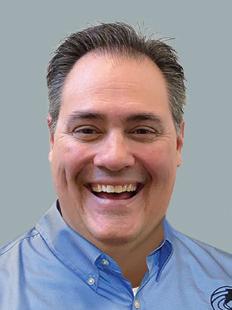
Evaul has served IBSA as a zone consultant since 2016, and will step out of that part-time role as his new assignment begins.
Roger Marshall will serve as IBSA’s zone consultant in Zone 7, relating to Rehoboth, Kaskaskia, Louisville, Olney, Palestine, and Westfield Associations. Marshall retired from First Baptist Church in Effingham in July 2020 after 32 years as pastor.
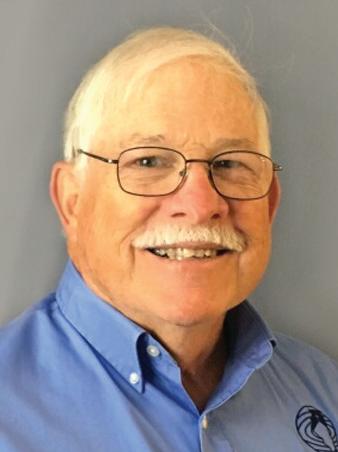
“Over the years, Roger has formed some wonderful and deep relationships throughout the zone that he will serve,” said Fran Trascritti, IBSA’s administrative director of leadership development.
Joe Oliver concluded his time as a zone consultant at the end of 2020, after more than six years of service in Zone 2. Oliver came to IBSA with decades of ministry experience in Fox Valley Association.


“I’ve been so blessed by the closer relationships with pastors and church leaders in my zone churches,” Oliver said. “The friendships we’ve shared will be long remembered and will continue. My prayer is that these significant relationships have impacted the churches and thus the kingdom.”

Ahead of each January issue, our editorial team asks, “How will we report on ‘sanctity’ this year?” The Sunday before the anniversary of the 1973 decision legalizing abortion in the United States is observed as Sanctity of Human Life on the SBC calendar. This year it falls on January 17. For many Southern Baptists, that is the Sunday their churches will address the issue of abortion. Pro-life advocates are often invited to speak, baby bottles of change are collected, and leaders urge participation in upcoming Right to Life demonstrations.
For the Illinois Baptist staff, we seek out news stories of effective pro-life ministries in local churches. And we have the privilege to point to the excellent work of the Baptist Children’s Home and Family Services. I have been moved by photos of BCHFS staff holding infants and stories of young mothers who chose not to end their unborn babies’ lives. The families who foster and adopt stir the heart as well as the tear ducts. And last year, we were delighted to report on the opening of GraceHaven pregnancy clinic in Mt. Vernon. There, volunteers show young women their unborn children on sonograms and help them make wise, godly, and life-preserving decisions. We hope BCHFS will have similar ministry opportunities in other parts of the state.
Our focus on saving the unborn is vital and must continue. A recent issue of the Illinois Times tabloid proved this with the headline “Abortion Haven.” Their report seemed to celebrate our state’s growing status as an abortion-provider destination,

as neighboring states limited abortion availability. That same headline would produce lament and weeping among Southern Baptists.
All that said, it seems important to note a lesson from 2020. Under the banner “Sanctity of Human Life,” our concern for the unborn is the beginning point. Our concern that life begins at conception— that people are created by God in his own image— extends through the course of life, past the grave, and into eternity. That greatly expands our responsibility in the here and now.
died from COVID-19. The doctor who shared the news choked up, because his colleagues were forging on through deep grief.
In the year of COVID-19 with all its fallout, we have gratefully witnessed Illinois Baptist Disaster Relief minister to the cause of human life by delivering semi-trailer trucks full of food to local churches which then distribute groceries to people who have lost their income this year.

We have seen children’s mission groups reach out to nursing home residents with cards and encouragement, while they have been cut off from visits with family.
We have heard of pastors and chaplains ministering to many grieving. One Illinois nursing home comes to mind where 26 of its 75 residents have
We have heard of nurses from our Southern Baptist ranks serving COVID patients in packed ICU wards. Early in the pandemic, one we met traveled to a distant hot spot where medical personnel were urgently needed. And she modestly declined to let her story be reported, not wanting to draw attention to herself.
And we could cite teachers and front-line workers of all kinds who daily prove their concern for the living in a season marked by disease and death. By their actions, they show that life in all its stages is truly sacred. If nothing else, COVID-19 has shown how deeply—and broadly—pro-life we really are.


Jesus said, “I have come so that they may have life and have it in abundance.”
Eric Reed is editor of Illinois Baptist media.

Southern Baptists demonstrated broad commitment to human life in 2020.
As pandemic-related challenges persist, Illinois leaders see new opportunities for churches
A recent “Thanksgiving Song” by musician Ben Rector sums up 2020 this way: “We’ve made it through, I do believe, the longest year in history.”
Can you feel that? We’re beginning to crawl out of the isolation we’ve been experiencing for the last year, and many of us are wondering what the next season of life will be like.
But this is the first national crisis I can remember when there wasn’t a call for national prayer or a rush back to church. In fact, we’ve seen the opposite happen. There’s been a call to close churches, an emphasis on following science, and a ghostly silence about God’s involvement in bringing hope and healing.
This leaves us with a lot of questions. Will people come back to church? Will there be a renewed interest in spiritual things? Or has the ground of our state and the hearts of Illinoisans hardened as a result of the COVID-19 pandemic?
Conventional wisdom would say only time will tell, but biblical wisdom says the fields are white for harvesting.
Many pastors will be recommending strategies and next steps as we face the challenges of reaching our friends, family, and neighbors this year. There will be books, blog posts, and podcasts touting the best strategies, exalting the best practices, and promising the best results. It is incumbent upon us to trust the promises of God and to call upon his power to save. Our role in the harvest is prayer and faithfulness. The fields are ready, and the laborers are on hand.
What we need is a mighty move of God to thrust out his laborers. We need God to stir the hearts of his people and push them out into action.
Revival and renewal have never been brought through political maneuvers, through national “calls,” or through cultural movements. Revival and renewal are works of the Holy Spirit of God. Let’s make the most important commitment we can make in 2021. Let’s commit to pray every day that God would send out laborers, because we believe his word is true, his arm is strong enough to save, and his people will be faithful when thrust out.
Rayden Hollis is lead pastor of Red Hill Church in Edwardsville.

Inside the section:
Awaiting a return to worship
Rebuild groups to relaunch outreach
Evangelism: Revive early church’s model

Online worship’s interactive potential Foster unity in turbulent times
Helping people in crisis
Small-scale, localized missions
Remind worshipers why we need each other
As a Chicagoland pastor and IBSA zone consultant, I have the privilege of serving alongside leaders who over the last several months have demonstrated incredible resilience amid inconceivable challenges. Among them, there is a shared sentiment that the effects of COVID-19 have been spiritually, emotionally, and physically draining. And though there is optimism that 2021 will bring some relief, to move into the new year without taking into consideration the “aftershock” of the virus could prove detrimental.
In Chicagoland, pastors are concerned about the reluctance to resume in-person worship. Some churchgoers are in no rush, while more than a few have already communicated they may never return. The reasons vary, but each has serious theological consequences. For some, virtual church has become such a suitable alternative that they have grown to enjoy the convenience. For others, it is the inability to trust when it is truly safe to return—a consequence of lingering fear. Most disheartening, however, are those who have simply fallen away. They were on the fringes before the pandemic, and mandates to shelter in place only provided an excuse to disconnect permanently.
Church leaders are not powerless to meet this challenge in the new year. For me, one practical solution has been to review the Zoom and Facebook interactions each week.
When I notice someone hasn’t been on for two or three weeks in a row, I reach out to them. For those who I sense are slipping away because of convenience or spiritual lethargy, I feel compelled to reinforce truth—through preaching, teaching, and writing—as it pertains to the necessity and importance of biblical fellowship.
Some people may stay away out of concern about the virus still very much affecting our city. When I talk to them, I share areas where God is at work and how he has continuously taken care of us and provided for us during this season. In addition, when I teach about the importance of fellowship, I also reiterate the need to trust in the Lord because I have come to realize that only he can help us deal with fear and anxiety.
What is paramount to pastors is not refilling empty pews, but the spiritual welfare of God’s people. While there are no definitive answers, one solution seems to resonate: With relentless prayer and utter dependence on God, pastors must continue to develop creative ways to reach the lost while emphasizing the essential nature of biblical koinonia, knowing that ultimately, the Lord is responsible for his church.
Bryan Price is senior pastor of Love Fellowship Baptist Church in Romeoville and an IBSA zone consultant in Chicagoland.



In 2021, churches have a pivotal role as communities recover and rebuild. They will be the bridges that carry hurting people to Jesus.
For some, the COVID-19 pandemic exacerbated crises already present in their lives. A healthcare hardship or employment struggle was only made worse by the challenges of 2020. For others, the pandemic threw them into new crises from which they’re still reeling.
In the first six months of the pandemic, Pew Research reported, a quarter of American adults said they had trouble paying bills. Around 4-in-10 said they or someone in their household lost a job or wages due to COVID-19. And the struggles are more than financial. The normal ways we live and deal with difficulties have been upended.
The new year is an opportunity for the church to intervene in all kinds of crises, and to ask questions that get to the heart of the matter and point people to Jesus.
Some of our ministry this year will be to connect people with resources they may not know are available to them. In other cases, churches will need to do a “gap analysis” to determine what ministries are missing from their communities. Where can we lean in and meet a need not yet being met?
To quote a well-known phrase, the church can be a lighthouse, rather than merely a landmark. The ministry at hand is pastoral ministry, but it can be done by people who aren’t necessarily the pastor.
Underlying all our ministry must be the desire to see true transformation. Jesus could look at somebody and see the physical need, but also the heart. We need to ask the questions behind the situations in front of us. Everything we do should be about trying to build a bridge to get that person to the gospel.
Carmen Halsey is IBSA’s director of leadership development.
Maximize virtual connections
Who would have thought even a year ago that churches of all sizes would routinely broadcast worship services? In the new year, churches will have opportunities to use these online services to start gospel-centered conversations with virtual worship attenders. Here are four ideas for churches shaping their engagement strategy for online worship:
1. Interact in real time. For inperson worship, the preaching of the word involves one-way communication. In a virtual setting, it can be much more interactive, as those online often use the chat features to share thoughts along the way. Church leaders who show a willingness to chat with guests in this way open the door to deeper conversations.
2. Assign virtual worship hosts. They should be friendly, capable, and eager to talk with people in this format. Hosts can ask questions and interact throughout the service to encourage engagement.
3. Offer prayer and connection opportunities. Toward the end of the streamed service, a good practice is for the hosts to offer ways for attendees to respond. This can be done by sharing a link for guests to share requests for prayer or pastoral care.
4. Pursue a strategy to move people to groups. Many churches now have virtual Bible study offerings, and if so, this is a chance to move online guests to a deeper engagement. Through the chat function, hosts can share group invitation links and times as the virtual worship wraps up.
Online worship is a unique opportunity to engage virtual visitors. It may also provide new service and evangelism opportunities for church members. Remember, regardless of the method, worship is about the life-changing gospel. May the Lord use us to change the world!

Fran Trascritti is IBSA’s administrative director of leadership development.

“Today, most pastors use church online to get people into the building. In the future, most pastors will use the building to reach people online.”
– Carey Nieuwhof, pastor, Barrie, Ontario
I was walking recently with a friend who works for a ministry that reaches out to young families. I asked him what has worked to reach them during the pandemic. He explained his current approach to ministry is praying for families first, then showing care for them, and finally sharing the hope of the gospel in a spiritual conversation. “Those among my people who actually love the families they are engaging have spiritual conversations on a regular basis,” he said.
Traditional ways of exposing lost people to the gospel have been unsuccessful during the pandemic. The most basic approach—inviting people to church to hear about Jesus—doesn’t work because many are afraid to attend. And missiologist Ed Stetzer tells us this approach may continue to disappoint even after the worst of the pandemic is over.

I usually have meaningful spiritual conversations only after I have begun to build a relationship with someone, and after they know I care. People around us usually know whether we do. Spiritual conversations will happen if we love well. Does it take longer? Yes. Is it worth it? Yes! Let’s cut through the clutter of our current evangelism confusion by finding ways to engage people who are far from God, and loving them the way Jesus did— unconditionally.
Eddie Pullen is IBSA’s church planting director.
Last year not only divided the church physically, but it also created an atmosphere of division that’s unlikely to disappear with a new calendar or the arrival of a vaccine. Yet, even more important than a church gathered is a church unified. Just before his betrayal, Jesus prayed for the unity of the church. “May they all be one, as you, Father, are in me and I am in you. May they also be in us, so that the world may believe you sent me” (John 17:21).
So how do you cultivate unity in a climate of conflict? Whether you’re the pastor or a church member, do these two things:
Love people. 1 Corinthians 13:4-7 should be the model for how we love others, especially in the church. Love like this resists divisions. It seeks to understand first. It thinks the best of others, even those with differing opinions.
Focus on the gospel. The self-sacrificial mission of Christ is worthy to be elevated above all. Let it be the lens through which you see a divided world. Let it be the only message worthy of your time.
Unity doesn’t mean uniformity. Differing ideas about many things may remain, but let these be your center, and the church that gathers around them will be one in Christ.
Ben Jones is director of leadership development for IBSA.
Rebuild with a tried-and-true formula
In 1920, Arthur Flake came to the Southern Baptist Sunday School Board and found a denomination in crisis. The Spanish Flu epidemic of 1918-1920 had caused many churches to pause their ministries in ways that would seem eerily familiar today. But it was the need to rebuild afterward that set the stage for unprecedented growth in baptisms and attendance through outreach-focused groups ministry. Flake would become known as the founder of the modern Southern Baptist groups movement.

As Flake prayed, planned, and worked tirelessly, the Lord showed him a biblicallyrooted formula that we can use to rebuild our disciple-making ministries today.
1. Know the possibilities. Vision is necessary to re-grow a thriving groups ministry. Take time, prayer walk your community, study the demographics, and let God impress upon you and your leadership that there is tremendous potential!
2. Enlarge the organization. My grandfather always encouraged me that if I believed God had called me to pray for something, that even as I prayed I should make preparations for him to answer the prayer. If we were praying for rain, I would often see him carrying an umbrella. As you pray for God to bring revival and
grow your church, begin to identify where new groups would meet. Plan to offer multiple times and locations.
3. Enlist and train workers. Identify potential leaders and develop them. Reach out to IBSA and your local association for resources and training opportunities in groups ministry and evangelism.
4. Provide resources and space. Now is a perfect time to be sprucing up your facilities and preparing new group space. As you move into 2021, identify and prepare the space (either on or off your church campus) to reach the number of new groups you’d like to start.
5. Go after the people! The only way we are going to see an abundant gospel harvest in Illinois is if we do an abundant planting of the gospel in thousands of lives. Pastors should work to sharpen their gospel-sharing and inviting in their messages. Gospel conversation training will help Illinois Baptists saturate our state with the good news of Jesus and loving invitations to come to Christ.
It could be that we are on the cusp of Illinois Baptists’ most exciting, fruitful chapter on mission with God as we leave this pandemic. Rebuilding and growing groups ministry is a sure way to help make that happen.
Scott Foshie is revitalization director for IBSA.




Requires streamlined outreach
The rise of online education and remote work has changed community dynamics in ways that will last even after the pandemic is over. Across all sectors, there is an increasing push to decentralize industries that don’t require daily face-to-face engagement.
The psychological impact could be profound for the church. People who consider themselves outsiders will be even more skeptical about attending a worship service outside their comfort zone. Here are three ideas to consider as we seek to engage increasingly distant neighbors: Microfinance neighborhood evangelism. Churches can budget funds for families to host smallscale evangelism events (cookouts, craft nights, clean-up Saturdays) in their neighborhoods. Small-scale events prioritize evangelism as everyone’s responsibility, and orient the entire church to a “going” versus
“gathering” approach to ministry. Create community space. There will be an increased demand for common space for people to work, go to school, and socialize. Churches that consider transforming some of their space to a friendly, safe work and school space with high-speed internet and ample coffee will capitalize on new evangelistic opportunities.
Connect with new movers. People will be on the move more in the next 20 years than in the last century. Create a welcome kit for new families, and train church members to engage new neighbors. As many people move to new areas, churches who position themselves to welcome new neighbors can sow the gospel.
Brad Lovin is IBSA’s missions director. To learn more about local missions innovation, contact him at BradLovin@IBSA.org.
“In turbulent times like ours we all need to consider how to be sure that evangelism does not get lost.”
– Ed Stetzer, Billy Graham Center, Wheaton College ARTHUR FLAKE
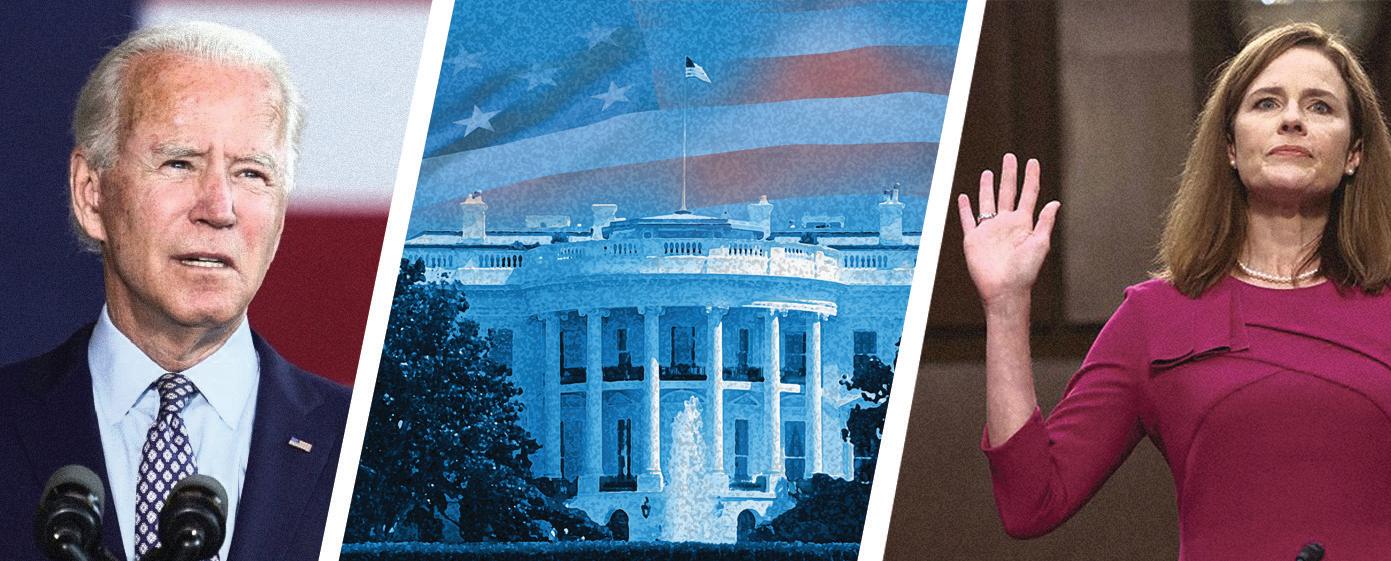
Evangelicals, including some Southern Baptist leaders, enjoyed a closer relationship with President Donald Trump than with the previous presidential administration. But with the election of Joe Biden, that relationship is expected to chill due to his positions on abortion, LGBTQ matters, and other issues on which evangelicals and the Presidentelect hold vastly different views.
Biden campaigned on reversing the pro-life measures undertaken by the Trump administration, including ending foreign aid for abortions. His pick for Secretary of Health and Human Services is a staunch proponent of abortion rights. Biden has also pledged to advance LGBTQ rights and reverse religious liberty protections enacted by the previous administration.
Still, some evangelicals have expressed interest in opportunities to work with Biden. And more have called for prayer for him and the country.
“Join me in praying for @joebiden and our country,” tweeted SBC President J.D. Greear after Biden was projected the winner of the election. “Pray for wisdom, justice, and truth. I pray for success in where he leads in what is righteous and right.”
In late 2020, one of the country’s largest LGBTQ organizations released its legislative agenda for the Biden administration. The Human Rights Campaign’s “Blueprint for Positive Change 2020” includes 85 policy recommendations that could be implemented by Biden without congressional approval.
One of the proposals would strip accreditation from Christian colleges that uphold policies opposing homosexuality. Albert Mohler Jr., president of Southern Baptist Theological Seminary, called the document “sinister” and the threat to revoke a school’s accreditation an “atomic bomb.” He further determined the recommendation “is an undisguised attempt to shut down any semblance of a Christian college or university that would possess the audacity to operate from a Christian worldview.”
Biden himself campaigned on several key LGBTQ issues, including reinstating the Obama
administration’s guidance on school restrooms to guarantee transgender students access to facilities based on their gender identity. The President-elect also has pledged to end the ban on transgender military service, and to revoke religious exemptions for businesses and other organizations that hold to a biblical view of marriage and sexuality.
One early cabinet pick also alarmed evangelicals. As California’s Attorney General, Xavier Becerra defended the state’s Reproductive FACT Act, which forced pregnancy centers to inform clients about public programs that provide family planning services, including abortion. In the 2018 case National Institute of Family and Life Advocates v. Becerra, the U.S. Supreme Court ruled in favor of pregnancy centers.
“Mr. Becerra has a consistent track record of opposing religious liberty and cultural values emerging from religious convictions,” said Jeff Iorg, president of Gateway Seminary in California. “He will, no doubt, demonstrate his convictions and use his position to further those positions if his cabinet appointment is approved.”
Despite evidence that Christian views on the sanctity of life could be sidelined in the new administration, voters in November elected 17 new prolife women to the U.S. House of Representatives, with races still contested in Iowa and New York. At least 11 of the women replace pro-abortion incumbents. Another 11 pro-life women incumbents were re-elected.
Pro-life advocates celebrated the victories.
“These gains are a repudiation of abortion extremism,” said Marjorie Dannenfelser of Susan B. Anthony List, “and further evidence that life is a winning issue in politics.”
In Illinois, Mary Miller was elected to represent the state’s 15th congressional district. On her campaign website, the Oakland, Ill., resident expressed support for the Hyde Amendment, which bans federal funding for abortion, and for efforts to defund Planned Parenthood.
Prior to the Nov. 3 election, pro-life jurist Amy Coney Barrett was confirmed to serve as an Associate Justice on the U.S. Supreme Court. Barrett has already weighed in on a few emergency rulings of the Court, including a ruling in which she joined the majority in voting 5-4 against the State of New York reimposing limits on religious gatherings as part of its COVID restrictions.
After Biden was projected as the winner of the election Nov. 7, Baptist leaders called for prayer for him and for the country.
“Southern Baptists are a praying people,” said SBC Executive Committee President Ronnie Floyd, “and I call for everyone to obey the sufficient Scripture’s command to pray for our government leaders every day. Only God can heal the deep division in America and this is why we must pray.”
Meanwhile, some evangelicals have expressed interest in opportunities to work with the Biden administration. Galen Carey, vice president for government relations at the National Association of Evangelicals, told the Washington Post that he saw several areas for collaboration including immigration, paid family leave, and criminal justice reform.
“We have principles that we think should be appealing to all Americans and we’d like to be a constructive force for the common good,” Carey said.
Robert Jeffress, pastor of First Baptist Church in Dallas and a vocal Trump supporter, told the Associated Press he would respond to any outreach attempt by Biden. Jeffress said the possibility that the President-elect could “be pulled away from extremist positions” is “a plus not just for conservative Christians, but for all of America.”
– With information from AlbertMohler.com, Baptist Press
When Joe Biden is inaugurated Jan. 20, he will become the country’s second Catholic president. But his election wasn’t powered by overwhelming support from Catholic voters. President Donald Trump won 50% of the Catholic vote, compared to Biden’s 49%, according to an Associated Press VoteCast survey. While 57% of white Catholics voted for Trump, 67% of Hispanic Catholics chose Biden.
“The election results show that the Catholic Church is as divided as our
nation, but the real divide is race and ethnicity, not theology,” David Gibson, director of Fordham University’s Center on Religion and Culture, told America Magazine
But many Catholic leaders have expressed deep concern that Biden doesn’t support the faith’s traditional pro-life teachings. Additionally, Biden’s views differ from Catholic convictions opposing same-sex marriage, and he supported pandemic-related lockdowns which kept Catholics from attending Mass.
When John F. Kennedy ran in 1960, he was compelled to state frequently, “I am not the Catholic candidate for president.” Addressing a group of Southern Baptist leaders at the Greater Houston Ministerial Association, he told them, “I believe in an America where the separation of church and state is absolute—where no Catholic prelate would tell the President (should he be a Catholic) how to act and no Protestant minister would tell his parishioners for whom to vote.”
Instead, Kennedy said he believed in an America “where religious liberty is so indivisible that an act against one church is treated as an act against all.”
Kennedy was a controversial choice in 1960 because non-Catholics, including many Southern Baptists, feared he would take direction from the Pope. Biden’s recent election has stirred controversy not about his Catholic faith, but because of how his policies depart from it.
When adoption specialist Regina Thompson called Jennifer Money in October 2019, she knew what she had to say was potentially life-changing. Money and her husband, Daniel, had recently adopted a little boy after years of struggling through an often difficult process.
Now, Thompson and Baptist Children’s Home and Family Services had another opportunity for the Money family—a baby would be born that evening, and would arrive in immediate need of a family. The couple only had an hour or two to decide what to do. After a few additional phone calls, the Moneys drove to the hospital, where they were handed hour-old Asher Brave.
“We had been praying about this for years,” Jennifer said. The family, who at-
tend Ozark Baptist Church, pushed through the fear and uncertainty of the unexpected second adoption with hard-earned faith in the God who had made their son in his image.

“One thing we know is he’s the giver of life,” Jennifer said. “He knit him together in his mother’s womb, and he had a plan for this little boy.”
She called their adoption story a “double miracle.”
Regina Thompson has served 30 years with Baptist Children’s Home and Family Services. As project manager of the agency’s Faith Adoptions ministry, she helps couples complete the home study process, which involves several hours of interviews. As a licensed child welfare agency, BCHFS can
also place children in adoptive homes. Thompson works with both birth mothers and adoptive families in Illinois, which is how she came to meet the Moneys.
As a young married couple, Daniel Money used to joke that he and Jennifer would have 10 kids. Their oldest daughter, Abigayle, is in college now. Eight years after her birth and a struggle through infertility, the Moneys welcomed a second daughter, Anna. But severe complications after the birth left Jennifer unable to have more biological children.
Jennifer said she struggled for a while after that, grieving something she wasn’t going to have. But God intervened. “I remember the day he opened our eyes to see that he wasn’t absent in our pain or suffering, but that he was literally in the midst of it,” she said, her voice breaking. God had a bigger picture, a bigger plan, she said. “When I rested in that, there was so much freedom, and so much life that was given.”
God’s plan for life is at the center of BCHFS’s ministry to families across Illinois. At Angels’ Cove Maternity Center in Mt. Vernon, they provide a place to live for mothers and babies, as well as parenting education, counseling, and family care. Across the street, the newly opened GraceHaven pregnancy resource clinic offers counseling to expectant parents and free ultrasound services.
Adoption is both a joyful and a grief-filled process, Thompson said. The hardest part of what she does is seeing couples grieve over infertility, and birth mothers grieve over an extraordinarily difficult choice. But, she said, “There’s joy from the grief of the one making the sacrifice.” There’s joy over knowing a child will have a loving home.
In 2013, the Moneys started the adoption process, with Thompson helping them complete their home study. Soon after they completed it and the required training, they were chosen by a birth mom to adopt her baby girl. But at the hospital, the mother decided not to go through with the adoption. In the months that followed, the Moneys heard about several other children, but the birth parents chose other adoptive families.

“You have to stay grounded in the faith and where God has placed you,” Jennifer said. “For us, it was like, ‘God has a plan.’ Whether we get to take this one home or not, we are compelled to keep going forward in it.”
The next year, another mom chose the Moneys to adopt her son. The couple sat with her at the hospital for 30 hours, but they knew she wasn’t ready to let him go. They gave her all the things they had for the baby, who turned four last year. The Moneys still pray for him and his mom.
The difficult experience was followed by a period of silence, the couple said. At the same time, abortions were increasingly easy to procure. The family went to St. Louis to protest Planned Parenthood. They also decided to cast a wider net, signing up with a Christian adoption agency and increasing their fundraising for an adoption. Still, any possibilities eventually came up empty.
The process was wearisome, Jennifer said, and they were getting older. With their home study set to expire in February 2019, the couple de-
cided not to renew it. After following through for several years, they thought God was saying no.
She was waiting for her daughter to finish a violin lesson when she got a call from an acquaintance who knew of a baby due in February. The mother wanted to choose adoption, and the Moneys’ friend asked if they would be interested. On Feb. 26, they were at the hospital when Abraham was born. “It was the most bittersweet thing we’ve ever walked through,” Jennifer said. A birth is typically joyous, she said, but the couple was guarded because of past disappointments. And they were watching Abraham’s mother grieve too. When she was released from the hospital, the Moneys gave her a ride home. Then, they took Abraham home with them.
The couple got to know their son’s birth mother well through the private adoption process, and still schedule visits for her and Abraham. Jennifer recounted a conversation that cemented their connection, when the young woman said she knew God is the creator of life, and abortion was not an option for her despite very challenging circumstances.
“From the point that I heard that, it knit me closer to her,” Jennifer said. “And we would be in love with this boy together.”
The Moneys finalized Abraham’s adoption on Sept. 16, 2019. Two weeks later, Thompson called and asked the fateful question. “Are you sitting down?”

BCHFS had gotten a call that day about a mother in labor who wanted to place her baby for adoption. “Our family and friends I’m sure thought that it was a little crazy,” Jennifer said of the possibility of a second adoption so soon after the first. But the couple trusted that God’s plan was perfect. Now, Jennifer said, “We can’t imagine our life without Asher.”
Asher has since met his birth mom and extended family, and the Moneys pray everyone they’ve met through their long process will eventually come to know Jesus. Their years-long adoption journey has inspired what Jennifer called “relentless trust” in God, whose plans can’t be thwarted or changed.
“I wouldn’t change any of it, at all,” she said.
“Even our ages, where we are now.
“His timing is perfect.”
Even now, it’s easy to tell the story and forget the very real struggles and darkness they walked through, Daniel said. It’s not for the faint of heart, he added.
“It’s going to be hard no matter what. But he is always good. He’s always right. He’s faithful.”
J.D. Greear is scheduled to be the first president of the Southern Baptist Convention to speak at the annual March for Life in Washington, D.C. in January.

“I am honored to be invited to this historic and important event,” Greear said of the march held every year on or around the anniversary of the Roe v. Wade court decision that legalized abortion nationwide in 1973. “Christians are called to defend the vulnerable, and there are none more vulnerable than innocent children in the womb.” Along with the Washington event, local March for Life gatherings are planned around the country.
Donor funds ultrasound machines
The Ethics and Religious Liberty Commission will deliver a record-high 10 ultrasound machines to pregnancy resource centers over the next six months, thanks to an anonymous donation to its Psalm 139 Project. Previously, the most machines placed in a year was five.

ERLC President Russell Moore said the influx of technology “is a pivotal way of helping people to see that these children are not abstractions—‘unplanned pregnancies’ or ‘concepts of conception’—and mothers in a time of crisis are not abstractions—‘potential choosers of abortion’—but that all of them are made in the image of God, loved by Jesus, and to be loved by those who bear the name of Jesus.”
Southern Baptists have adopted more than two dozen resolutions on the sanctity of life, including many opposing abortion. But it’s not the only issue to move Baptists to a corporate response. In 2015, Southern Baptists voted to “affirm the dignity and sanctity of human life at all stages of development, from conception to natural death.”
Over the years, other measures have addressed pressing issues related to the sanctity of life. In 1996, amid national debate over assisted suicide, Baptists resolved to “vigorously denounce assisted suicide as an appropriate means of treating suffering.” In 2005, Baptists urged the U.S. Senate “to reject any legislation that calls for embryo-destructive research,” and called Southern Baptists “to consider ways they can become involved in lifeaffirming activities, including adopting embryos being stored at fertility clinics.”
– Baptist Press, SBC.net

Before my wife, Gloria, and I even married, we vowed to establish a rock-solid family tradition of daily devotions together. But after almost 25 years of marriage and building a family, we could count on a single hand the longest streak of consecutive days when every member had come together for family worship or devotions or Scripture reading. From one year to the next, our routines only got busier. Even the responsibilities of Christian ministry seemed to be an obstacle of our family devotion time.
Then in March 2020, Coronavirus came to town in a big way, and everything changed. Shutdown. Quarantine. Isolation. Like most, my family sequestered together. It wasn’t but a few days into “Stay Home—Save Lives” when instead of going to our corners of the house and our electronics, we stayed seated together after the evening meal and opened the Book. Actually, we turned the Book on, on our phones.
Since then, in the seemingly endless expanse of the constantly shifting sands of misinformation, opinions posing as facts, and outright lies in the guise of truths, God has put on display the superiority of his unchanging word. Since starting our daily family devotions, my family has hardly missed a day to sink our roots into God’s word together. And when there have been those rare occasions to miss, two rounds are scheduled for the following day—not because we have to, but because we want to. We need to sit together in God’s word and in his presence.
So what’s the new record, you may ask. How many consecutive days of devotions have we had together? Who knows? We stopped counting when we ran out of hands, fingers, and thumbs. It’s a habit. It’s becoming a tradition. Long after this awful season becomes a memory, God’s word will prove trustworthy.
“The entirety of your word is truth, each of your righteous judgments endures forever” (Psalm 119:160).
John Yi is an IBSA church planting catalyst in northeast Illinois.

Instruments in the Redeemer’s Hands
Paul David Tripp


No matter a church’s size, the counseling needs will always be greater than the staff can handle. As followers of Jesus, we can help others. I believe this book has the potential to change lives and the church.
Gospel Reset
Ken Ham

In our post-Christian society, we need to meet people where they are to share Jesus with them. And often, where they are doesn’t include knowledge of Bible stories, sin, or forgiveness. What an awesome thing that we get to be the ones to introduce them to these truths!

Blue Letter Bible App
“Being a part of a church family is part of growing as a follower of Jesus,” said Sarah Bordewick, director of family ministry at First Baptist Church in Mt. Zion. “But kids spend far more time in their homes. That’s why we want our families to go deeper together.”
In the newest issue of Resource magazine, Bordewick describes the partnership between parents and the church in the spiritual growth and development of kids and students. The Spring 2021 issue is dedicated to that theme: Faith starts at home, and churches have a unique opportunity to help whole families grow in Christ together. The issue also includes outreach ideas for spring, upcoming events and training opportunities, and planning space for leadership teams. Find it online at Resource. IBSA.org, or e-mail Communications@IBSA.org to sign up for a subscription.
Bible study can be challenging, but there are many resources that make it easier. One of my favorites is Blue Letter Bible, a free app that provides commentaries for every text from famous theologians, interlinear translation in both Greek and Hebrew, and daily Bible reading prompts.
I want to develop healthier habits in the new year, including setting aside time for the Lord and getting more sleep. How should I get started and avoid flaming out in a few weeks?
Godly life changes should be encouraged no matter what time of year we choose to make them.
Unfortunately, recent statistics show us that 80% of all New Year’s resolutions fall flat within the first month. Why is that? We usually rush into change-making without taking enough time to uncover the root causes of our problems, or to recognize our God-given strengths. After all, change that leads to growth begins with gratitude to God for the strength he has so graciously given us.
MARK McCORMICKEditor’s note: Pastor Doug Munton posted this column on his website just as the first COVID-19 restrictions were implemented. Now, many months later, it seems an even more vital word as we contemplate life after the pandemic. Personal revival is a challenge in isolation; now our churches— and we ourselves—need a fresh wind of the Spirit as we eventually emerge to new life and renewed ministry.

Like many, I’m praying for revival in our day. By revival I mean Christians returning to a deep intimacy with the Lord.
Revival is the condition of believers being right with God and living in close fellowship with him. When revival comes, it certainly makes an impact on the world. Revival, however, is for believers who know the Lord, but have drifted from full surrender to his will and his ways.
Simply put, God is the source of all meaningful ability to change. Therefore, it is wise to take an annual inventory of your life, and God’s presence in it. The divinely inspired organic growth we seek flows out of our gratitude for the grace God has shown us. If our desired changes are to last, they must be rooted in the grace of our sustainer. Here are three areas to consider:
Grace. Looking back at the year, how has God blessed you and your family? How has he proven he is fully in charge? Can you think of a time when he lifted you out of shame, grief, or despair? How might daily awareness of God’s grace empower gratitude?
Gratitude. How often this year did you give thanks specifically for God’s grace? How did your gratitude for God’s grace affect relationships with friends, family, or coworkers? How might daily gratitude for God’s grace enable growth?
Growth. Has gratitude for God’s grace illuminated the dark areas in your life that need changing? How will acknowledging the source of your strength help you to grow and change?
Once you have completed this inventory, you should be better prepared to not only discern what needs to be changed, but also to celebrate the growth God delivers.
Mark McCormick is director of clinic operations for Illinois Baptist Children’s Home and Family Services. Send questions for Mark to Illinois Baptist@IBSA.org.

So why should we want revival? Why should we care? Here are some reasons to desire revival in the life of our churches and in our personal lives.
1. Because God has something better for us than casual Christianity. What God wants for you is better than what the world wants for you. Casual faith tries to live like the world and look like the world. “Don’t be too radical with your Christian faith,” it warns.
But God’s way is so much better. I didn’t say it is easier, but it is better. My dad used to tell a story about a guy who got passage to America on a ship, but
he didn’t have money for anything else. So, he brought some cheese and crackers along and subsisted on them. Finally, he couldn’t stand it any longer and asked the captain if he could do anything to earn money to eat with the other passengers. “Your ticket entitles you to all the food you want on our ship!” the captain informed him. Too many followers of Jesus have settled for the crackers of cultural Christianity when God offers them all the fruit of the Spirit. Revival shows us God’s better way.
2. Because closeness with God is what we were made for. Adam and Eve were created
for fellowship with God. He wanted their presence and their company. May I remind you, follower of Jesus, that God loves and longs for fellowship with you!
Christianity is not primarily about rules and religion and behavior. It is primarily about a relationship with the living God through Jesus Christ his Son. For reasons I can’t fully understand, God wants closeness and intimacy with us. He loves us and he wants our love. In salvation, we are brought from condemnation to forgiveness, from death to life, from enemies of God to dearly loved children.
In revival, we come back to our first love. In revival, that closeness with God is restored. In revival, we rediscover the purpose of our lives.
3. Because God’s blessings are found in God’s person. What we are looking for is more than material wealth or pleasure or power. Getting a taste of these things reminds us that they never fully satisfy. Our soul longs for something deeper and lasting. Only God can fill our deepest void and only he can give our lives true meaning and purpose and joy.
Christian, what your soul is looking for is Christ. It isn’t hungry for materialism, because it knows it will never provide enough. Hedonism isn’t able to provide lasting joy, and your soul wants more. No matter how successful you may be in your career or hobbies, your soul is longing for greater things.
The Lord is our blessing. All that he gives to us—friends and family, possessions and pleasures, health and energy—only points us to the author of these blessings. He is the blessing. He is the source of our joy and our peace and our life. In revival, we return to the Lord himself and we find that he is who replenishes our soul. He is who we want and need. In revival, we remember that he is our blessing.
So, will join me in praying for revival in our day?
Doug Munton has served as pastor of First Baptist Church of O’Fallon for 25 years. He has served as a leader with IBSA, including as president of the state association. He blogs at dougmunton.com.
every three minutes.”

“And to make your virtual congregation more realistic, all their eyes oscillate to the clock
Isolation has taught us to value human companionship. But are we seeking an even greater intimacy?
Chicago | Starting Point Community Church distributed dozens of gifts to children through an effort called Project Joy.

Pastor Jonathan de la O said his church was compelled four years ago to create an outreach opportunity that would bless families in their immediate community. They registered 12 children to receive gifts the first year, then 23 the next year, and 48 the year after that.
This summer, Starting Point had the opportunity to build relationships with more families through outreaches built around pandemic-related needs. The church registered 129 kids for Project Joy 2020. His church has experienced God’s provision in amazing ways, de la O said. “We can honestly say that all of this has come from God’s working hand.”
Josh Crisp is the new pastor of First Baptist Church, Bethalto. A U.S. Army veteran, he grew up in Benton, Ill. Crisp previously pastored in suburban Indianapolis at Gospel Grove Church, which he planted in 2016. He and his wife, Bethany, also from Benton, have three children: Tinley, Lexi, and Silas.
David Howard retired in 2020 after 11 years as director of missions for Heartland Baptist Network. Prior to his time in Springfield, Howard served churches in Missouri, Louisiana, and Illinois, including Steel City Baptist in Benton and First Baptist, Harrisburg. He and his wife, Jo, will retire to a small ranch in east Texas, where they will be closer to their children and grandchildren.
Preston McKinnon is the new pastor of Charity Baptist Church in Greenfield. The long-time truck driver previously served through nursing home ministry, pulpit supply, and as a Sunday school teacher. He was interim pastor at Charity before the church called him as pastor. He and his wife, Sue, have one son and three grandchildren.

Doug Morrow is the new bivocational pastor of Springfield Southern Baptist Church. He will continue to serve as executive director of the Baptist Foundation of Illinois, a position he has held since 2010. Morrow has also pastored in Kentucky and at Dixon Springs Baptist Church in southern Illinois. He and his wife, Kim, have three adult children.
Kyle Ryan is the new pastor of Central City Baptist Church in Centralia. A graduate of Southern Baptist Theological Seminary in Louisville, Ky., he and his wife, Darcy, relocated to Centralia from Chicagoland, where they lived and ministered for two years. They have a daughter, Betsy Grace.

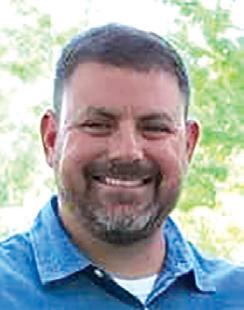

Rev. Robert William “Bob” Carter Jr., 84, of Vandalia died November 24. He served as director of missions at Rehoboth and Lake County Baptist Associations, as well as Madison Baptist Association before it became part of Gateway Baptist Association. Carter, a chaplain for the Navy, pastored churches in several states and led IBSA churches in Odin, Vandalia, and Reno as interim pastor. He was most recently a member of First Baptist Church in Brownstown with his wife, Juanita.

Phillip L. “Butch” Easter, 69, of Manteno died December 9. Easter was passionate about ministering through Illinois Baptist Disaster Relief, and served earlier this year in DeRidder, La., after Hurricane Laura. He was a member of First Baptist Church in Manteno with his wife, Lois, and served there as a deacon.
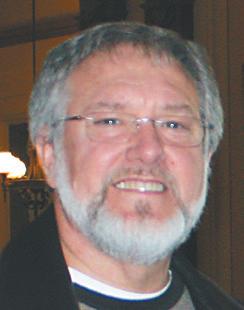
Dr. Clarence D. Haege, 88, of Freeburg died December 4. The longtime teacher, speech pathologist, and school superintendent also served as a pastor in southern Illinois. His ministry began at Springhill Baptist Church near Creal Springs, and included pastorates at Faith Baptist in Freeburg and First Baptist, New Athens. He also served as associate pastor of First Baptist, Marion, and was interim pastor for numerous churches. His wife, Carolyn, preceded him in death.

Mary Ruth Stuckey, 86, of Medora died December 4. Stuckey was a leader in Woman’s Missionary Union (WMU), a Sunday school teacher, and an active member of Mt. Pleasant Baptist Church in Medora. A long-time educator, she served after retirement with her husband, Don, on 18 mission trips to six continents. The couple also served with Disaster Relief, including work in New York City after 9/11.

 DAVE RAMSEY
DAVE RAMSEY
One of my resolutions this year was to start living on a budget, and gain control of my money. I never realized how easy it would be to get discouraged early on. Can you give me some encouragement to help make my financial resolutions stick in 2021?
The secret to making a goal into a reality is getting started. It’s really that simple. You also have to be realistic and accept the fact that nothing— especially things you’ve never done before—works out perfectly the first time around. That leads to the next step, which is patience. Most people think about losing 20 pounds, and immediately feel it needs to happen in the next month or so. It doesn’t. And mostly likely, it won’t. Like almost everything else worth doing, it’s something that requires sacrifice and focus each day over an extended period of time.
Crash courses are usually painful and rarely work out well. But once you’ve done something a few times, it becomes an easier and easier part of your daily routine. Pretty soon, it’s not a chore or something you’re afraid of. Making a budget and gaining control of your finances works the same way. When you first create a money plan, it probably won’t work out exactly as you hoped. That’s okay. It will barely work the second month, but it won’t be as scary, because you’ve already done it once. By the third month, you’ll have a much better feel for it, and your stress levels will go way down because you already know the basics. It just takes determination, patience, and intensity to get through the rough patches that go along with starting anything new. A new year is here. Don’t fall into the same old trap. Give yourself a little grace, but keep your eyes on the prize. It may feel like things are beginning slowly, but you can make this happen if you’ll just stick with it!
advisor Dave Ramsey is a prolific author and radio host.

Find more information on ministry positions at IBSA.org/connect
Send NetworkiNg items to IllinoisBaptist@IBSA.org
Elm Street Baptist Church in Murphysboro seeks a part-time music minister. Qualified applicants should send resumés to esbc1933@outlook.com, or mail to Elm Street Baptist Church, 1907 Elm St., Murphysboro, IL 62966.
Pastor Plus
On-the-job training for new pastors, or a refresher for any leader in need of it
Leading to the Next Level Equipping leaders in all areas of influence— relationships, marketplace, and the local church
ReVision Revitalization
Helping pastors prepare to lead change and revitalization
Church Helps
Guidance on current topics for church leaders
IBSA.org/leadershipdevelopment
January 11, 14
Tax Seminars
What: Valuable tax info for current and retired ministers, treasurers, and other church leaders
Where: Jan. 11: Gateway Association; Jan. 14: Online Information: LindaDarden@IBSA.org
January 17
Sanctity of Human Life Sunday
Resources: ERLC.com, BCHFS.com
January 19-20
Illinois Leadership Summit
What: The premier mid-winter gathering for Illinois Baptist leaders from every region; leaders will learn with and from one another how to expand their leadership skills, and use them to help grow effective churches in our unique context.
Where: IBSA Building, Springfield Information: AubreyKrol@IBSA.org
Edge Online Courses

What: Become a sharper leader right where you live and serve. Multi-week courses are instructor-led, fully online, and highly interactive.
When: New courses start Feb. 1 Register: IBSA.org/ibsa-online-courses
February 20
Church Technology Conference
What: Training you won’t find anywhere else, with a focus on using technology for outreach and worship
Where: IBSA Building, Springfield Information: BenJones@IBSA.org
February 27, March 6, 13, 27
What: Dig into Vacation Bible School with ideas and inspiration for multiple age groups and focus areas.

Where: Feb. 27: Chatham Baptist Church; March 6: Carterville; March 13: Mt. Vernon and Dixon; March 27: Chicago Information: JackLucas@IBSA.org
“In my experience, Gen Z is tired with the way our devices manipulate us,” college student
Amy Crouch wrote recently for Barna Research.
Crouch is the author of “My Tech-Wise Life,” a book about engaging technology in a healthy way, despite its constant, often overwhelming, presence in our lives.
Recent research from Barna shows young people are well aware of the benefits of ubiquitous technology. They appreciate the access to information, connection to friends and family, and being better informed about the world.

But they also acknowledge the ways technology can make life harder:
• They waste a lot of time.
• They put off/procrastinate doing homework or other things.
• They’re more distracted.
Teens prefer in person interactions, but often actually engage more digitally.
80% would rather talk to friends in person, but 65% say texting is more often what they actually do
Crouch and her father, Andy (who has written extensively on the topic), are challenging families to take the Tech-Wise Challenge in 2021. They propose that family boundaries and disciplines around technology can help teens counteract their tendency to bury themselves in devices. In many cases, the restrictions may be welcome. Barna found over 3-in-10 teens have had their parents set restrictions on technology, and 83% say the rules were “about right.” Among those whose parents’ didn’t set restrictions, half say they set their own limits.
“We don’t want to succumb to the pressures of tech,” Amy Crouch said, “but many of us don’t know how to avoid it.”
Nov. 2020
– Barna Research,
“While we’re grateful for the help that our devices can bring, we are also concerned about the ways that screens are making us become more lonely, busy, and bored.”
– Amy Crouch